"Prussian Moderation." - An alternative German AAR
- Thread starter unmerged(10426)
- Start date
-
We have updated our Community Code of Conduct. Please read through the new rules for the forum that are an integral part of Paradox Interactive’s User Agreement.
You are using an out of date browser. It may not display this or other websites correctly.
You should upgrade or use an alternative browser.
You should upgrade or use an alternative browser.
Vincent Julien said:I didn't mean to suggest that Mosley was the driving force behind the business with the League - that was pushed through mainly by Baldwin and the Tories, with some degree of sympathy from Mosley. Sorry if that was a bit ambiguous. Sam Hoare is still Foreign Secretary in this timeline, btw.
Mosley discovers the restraints implicit in the responsibilities of power then - he'd like to be friedlier with Italy but has to put British interests first. Understandable.
So, has Mosley's nutcases infiltrated the urban branches of the Conservative Party yet?
Book II - 1936 Onwards.
The Clouds Lowered - January - May, 1936
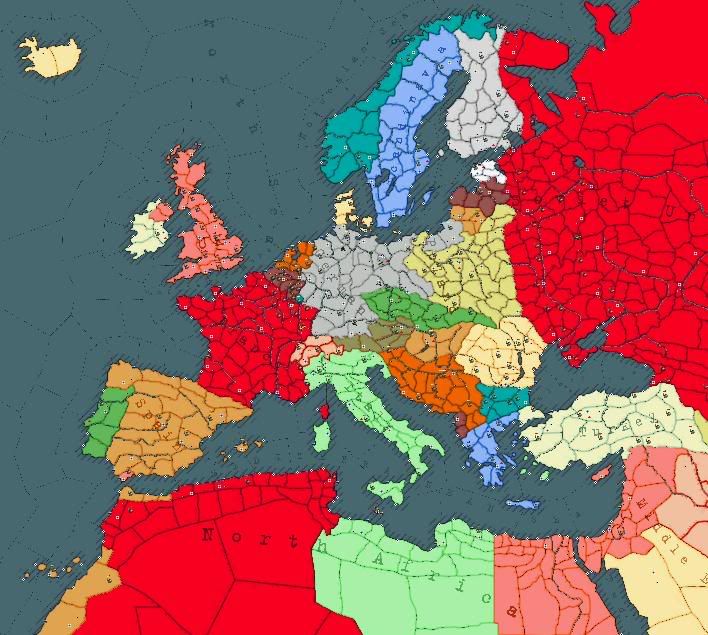
Europe, January, 1936

Europe, January, 1936
In retrospect, early 1936 would be seen as a time in which the conflicts of the future would first start to manifest themselves, with the first rumblings of war on the peripheries of Europe and Asia, not yet touching the lives of most of the populations of those continents, but inescapably real and explicit. As the New Year dawned, Italy was still engaged in its conflict in Abyssinia, but now with Italian ground forces ready to truly begin the push into the politically isolated African state.
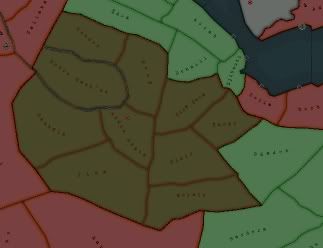
Disposition of forces in Abyssinia, January the 20th.
A large bulk of the Italian army under Rudolfo Graziani would begin their initial offensives in the first weeks of January, with swift progress being made, as Italy seized the Ogadēn region with minimal resistance, and the Abyssinians began to be forced back from the northern portions of the country, as Italy pushed in from it’s East African holdings with rapid - and some would say surprising - success.
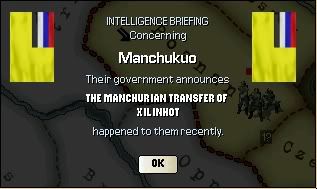
By the middle of the month, the Italians had made deep inroads into the country and Abyssinia was reeling from the shock. However, Abyssinia still maintained strong defensive positions in the interior of the country, and it remained to be seen as to when an Italian victory would be achieved. At the same time in the Far East, the transfer of the Xilinhot region to Japanese administration made the Soviets and the Chinese nervous, and prompted much questioning of Japanese intentions in that region.
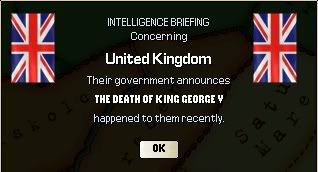
The world’s attention was drawn away from the Abyssinian conflict in late January, when, on the 20th of that month, it was announced to the British Empire and the world via the medium of the BBC Empire Service, that His Majesty, George V, King of Great Britain and Ireland, and Emperor of India had passed away. It would mark the end of an era, a reign that had stretched across twenty-six years, including the horrors of the Great War and it’s immediate aftermath. George’s reign had seen the transition away from the imperial certainties of the Edwardian period and towards a more flexible, more portentous existence in which the nation was unsure of itself and it’s place in the world. Despite this, George’s passing would be marked with great sorrow by his subjects, the vast majority of whom remembered him with a good degree of respect and avuncular affection. The crown duly passed to the Prince of Wales, Edward Albert, who took the regnal name of Edward VIII. Many wondered precisely what sort of monarch the new King-Emperor would prove to be, with some being quietly critical of his period as Prince of Wales.
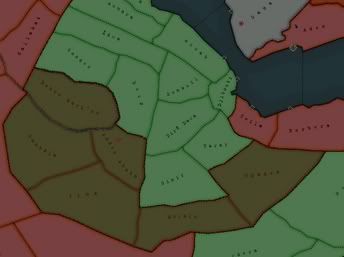
Disposition of forces in Abyssinia, February the 5th.
Despite continuing to press deep into Abyssinia in the north, Italy had suffered a major setback in early February, when Abyssinian forces, piqued by the arrogance of the Italians, struck into the Ogadēn region in a counter-offensive which was so successful in it’s scope that it succeeded in cutting off Italians forces in the north from their cohorts in the east. Despite the minor humiliation this entailed, the Italians continued with their offensive on the northern front and were soon within less than a hundred miles of Addis Ababa, where the sounds of Italian artillery could soon be heard over occasional Italian air raids. General Graziani, in overall theatre command, would send General de Bono to take command in the east and force the Abyssinians back from their positions in the Ogadēn region, although it was uncertain as to what bearing the Abyssinian move would have on the duration of the war.

Of particular European interest in the middle of February were the results of the Spanish elections to the Cortes, since it was taking place against a backdrop of increasing violence and unrest in Spain. Many Conservatives and Monarchists had never truly accepted the legitimacy of the infant Republic, with the years of Primo de Rivera’s ascendancy now enterting distant memory. The republic was now entering it’s fifth year, and had witnessed nigh-on endemic left-wing and anarchist violence and instability in the north, particularly in Catalonia and Asturias over the last two years. Even at the level of the central government, there had been much bitterness and politicking, which had produced little discernable results in terms of stability or unity. Consequently, President Alcalá had called for fresh election in an attempt to heal some of the divisions and produce a government with a clear mandate. However, the result of the election of the 17th of Feruary, resulting in a marginal win for a left-wing popular front - although the Communists of both camps had variously opposed the move - only served to heighten tensions as violence flared; churches were attacked, political offices ransacked and torched, mobs engaged in wanton violence, and many began to wonder if the country had not began to tip into the abyss of civil strife. Manuel Azaña Diaz, who would go on to be elected President in May, together with the new left-wing cabinet would now have to tread cautiously, as both right-wing and left-wing opinion became progessively more militant.
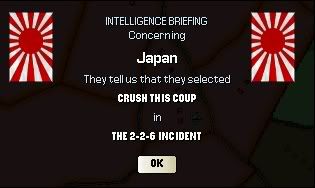
The Pacific was quietly shocked at the end of February, when news began to filter in of an attempted coup in Tokyo. While suppressed after a few days of upheaval in the Imperial capital, instability of this nature made Chinese and even Soviet and American observers uneasy. The coup attempt had an extensive pre-history, being born of the social and economic stresses of modernisation, and fostered by the supposed corruption, self-service and incompetence of bourgeois political life. The primary inspiration for the revolutionaries was Kita Ikki, a popular radical leader who fused Socialism and Imperialism into a kind of Nationalist radicalism. “The Japanese are following the destructive examples of the western nations”, he would write. “The possessors of financial, political, and military power are striving to maintain their interests under the cover of imperial power.” The youthful followers of Ikki within the army would often look towards violent solutions to the country’s problems, mainly centred on assassination of high officials within the Imperial government. Indeed, while unique in it’s relative success, this was not the first coup attempt to befall Japan, with the so-called Brocade Flag Revolution attempt having taken place five years previously. Japanese tradition had a kind of reverence for such idealised criminal violence, even a name for it – gekokujo - a term dating from the 15th century when civil disorder had been endemic to the point of legitimacy. Officers following this kind of reasoning had been instrumental in the Manchurian adventure several years before, with many forming themselves into organised groupings such as the Cherry Society.
Nevertheless, by the time of the 2-26 incident - as it was now being called - those who saw reform through a strengthened military had generally drifted into two opposing camps, with the ‘control clique’, composed of more senior officers within the army and the War Ministry mainly believing that territorial expansion in China and the west and south was key, and the ‘Imperial Way Faction’ believing that Japan’s interests were sufficiently assured by Manchuria and that internal reforms should take precedence. It was members of the latter strand who were behind the 2-26 incident, and who aimed to assassinate the Lord Keeper of the Privy Seal Saito Makoto, Finance Minister Takahashi Korekiyo, and Army Inspector General Watanabe Jotaro, among others. Intended victims who escaped included Prime Minister Okada Keisuke, Grand Chamberlain Suzuki Kantaro, Prince Saionji Kinmochi - the last remaining genro, revered statesman with a personal link to the Meiji past - and Count Makino Nobuaki. When the coup attempt was suppressed after several days of deep uncertainty in Tokyo’s government quarter, as the rebels stood ground against the army - the intervention of the Emperor was ultimately required to restore some semblance of order - it was the members of the control clique who had benefited. Whether the outside world realised it or not, Japan had taken a significant step towards a policy based around imperial expansion in East Asia.

Tensions would be further heightened when Generalissimo Chiang Kai-Shek, strongman of the Chinese Nationalist government, was kidnapped by some of his own generals in late March, in a move, which many thought prompted by the recent events in Japan. The leader of the Communist rebels in the North, Mao Tse-Tung, had been pressing for a ‘united front’ against the Japanese for some time - a strategy which partly originated in Moscow, with Stalin’s dim view of the united front strategy ever since the early twenties being set aside in the name of realpolitik. The arguments in favour of a united front had not, however, moved Chiang to change course; on the contrary, Mao’s army in Yannan was resisted as fiercely as ever. The man tasked with quelling Mao’s forces in the north, Chang Hsueh-Liang, commander of the North Eastern army, did not, however, share Chiang’s doctrinaire approach to the Communists, and had come to see the countrymen he was battling as far less of a threat than the grasping hands of the Japanese. Mao had begun to establish contacts with Chang, and had decided that it would be useful to work through him to convince Chiang. In consequence, on the 27th of March, Chang met with Mao’s confidant and top diplomat, Chou-En lai in the remote northern city of Xi’an to reach some form of agreement. Although a document was quickly drawn up listing the conditions of co-operation - equal treatment, a release of prisoners, lines of command - Chang had still not convinced his superior of the merits of his case. Before Chang could meet with Chiang, however, Yang Hu-cheng, another Nationalist commander, maintained to Chang that Chiang could only be made to listen should he be kidnapped. Moreover, Chiang was supposedly presently on his way to Xi’an to confront Chang directly with evidence that he was being influenced by the Communists. Although Chang agreed to kidnap Chiang in principle, he began to vacillate, until General Yang took matters into his own hands and seized Chiang soon after he arrived on the 2nd of April. It reportedly took two days before Chang could draw up the nerve to face Chiang directly, in an exchange, which produced few tangible results, with Chiang informing his subordinate that “You must not fall into the trap set by the Communists. Repent now, before it is too late.”
In partial desperation, Chang turned to the Communists for assistance. Chou agreed to meet with Chiang, a meeting fraught with some difficulty, not merely because Chiang had previously placed a bounty of Chou’s head. However, Chou was patient and affable, and after several days reached an agreement in principle with Chiang. Chiang was flown back to the Nanking on the 12th of April, where both he and Chang apologised to each other for their behaviour during the revolt, in a theatrical move designed to save face for both men. Chang was sentenced to ten years imprisonment, but was pardoned within twenty-four hours. Although Chiang was adamant that he had not caved into pressure, within weeks he was engaged in discussions with Mao regarding a cease-fire. By mid April, Mao had wired Chiang that he was prepared to end the state of hostility between the two, and by May an agreement had been signed which put an end to hostilities for the first time in ten years. China was at peace, but many wondered whether or not it would prove to be lasting.
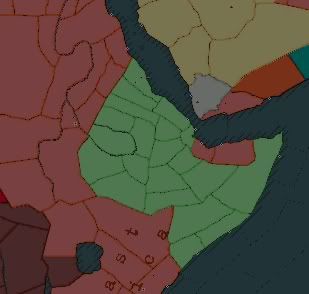
An enforced peace was certainly quickly encroaching on Abyssinia, where Italian forces had made swift progress during March, first with General de Bono recapturing the Ogadēn region and pushing the Abyssinians back into the interior, and then with a large assault on Addis Ababa, which fell on the 16th of that month. After the fall of the capital, it was only a short matter of time before the remainder of the country fell into the hands of the Italians, with the government in disarray, and Abyssinian forces suffering a massive defeat at the Battle of Maychew in late March. By the beginning of April, the Italians had seized the last major towns and villages of the south, and major organised resistance came to an end. Abyssinia was officially annexed on the 9th, with King Vittorio Emanuele being proclaimed Emperor of Ethiopia two days later. The new territories would be later reorganised into a new territory of Africa Orientale Italiana, (Italian East Africa) combinging the newly conquered regions with Italian Somaliland, Eritrea, and Afars and Issas, with General Graziani as Viceroy. While the relatively swift victory of Italian forces had defused the minor tensions that had resulted from the war, it had also set a precedent for imperial expansion, and many watched hesitantly to see how the rest of the year would unfold.
Last edited:
Allenby said:So, has Mosley's nutcases infiltrated the urban branches of the Conservative Party yet?
If they haven't, then they should be trying to.
Hope everyone likes the first actual game-update.
Thanks, Zauberfloete. 
Oh, and before anyone asks - Italy seized Affars and Issas way back in the late twenties, when everyone was pinching bits of France's colonial empire. I'm sure I mentioned this at some point but it must have been ages ago.
Oh, and before anyone asks - Italy seized Affars and Issas way back in the late twenties, when everyone was pinching bits of France's colonial empire. I'm sure I mentioned this at some point but it must have been ages ago.
They are. Can you not see them? I'm not logged into anything other than the forums, so there shouldn't be a problem.
Ah wait, yes, I see what you mean. That's Webshots for you, ladies and gentlemen. I'll move them onto Photobucket or something, but that'll have to be done tommorow now.
Ah wait, yes, I see what you mean. That's Webshots for you, ladies and gentlemen. I'll move them onto Photobucket or something, but that'll have to be done tommorow now.
Last edited:
Vincent Julien said:They are. Can you not see them? I'm not logged into anything other than the forums, so there shouldn't be a problem.
Ah wait, yes, I see what you mean. That's Webshots for you, ladies and gentlemen. I'll move them onto Photobucket or something, but that'll have to be done tommorow now.
I use Photobucket and it has not let me down so far. I can only hope you didn't pay the people at Webshots any money.
Like buggery I did. I'll never pay any amount of money, no matter how reasonable, to just host chuffing photos online.
Exactly. That's why Imageshack exists. Reads great, and I'm sure the pics will be just as good. 
Vincent Julien said:If they haven't, then they should be trying to.
Hope everyone likes the first actual game-update.
Very nice indeed! Can't wait for more!
i am sure that that will be true! ! ! !Vincent Julien said:...and many watched eagerly to see how the rest of the aar would unfold.
Yeah, webshots just isn't dependable enough for screenies. But the update read just as well without them. And lot's going on. I am impressed that you are able to not only keep a finger on what is happening the world over, but to also present it with such detail. Wonderful!
The world is quickly going to hell in a hand basket and we haven't even seen what is happening on the Continent yet.
The world is quickly going to hell in a hand basket and we haven't even seen what is happening on the Continent yet.
Now that's an update that makes one sit up and take notice, VJ! Nicely done.
Like coz said, the world is quickly going to hell in hand basket and we haven't even heard what's goin' in in Europe and the Americas! I do believe this is gonna be one sweet ride!
Like coz said, the world is quickly going to hell in hand basket and we haven't even heard what's goin' in in Europe and the Americas! I do believe this is gonna be one sweet ride!
Well, there you go. If anyone still can't see them, then give a shout.
Thanks for the continuing support, chaps. I appreciate it.
I appreciate it.
Thanks for the continuing support, chaps.
i saw nine pics. is that all of them? also, i did not see any red "X"'s...Vincent Julien said:So I assume from the silence that the pics are visable?
awesome AAR! !
Yup, I see all the pics. And a big huzzah! on the start of the game. Very good world update VJ, can't wait for more. 
Pictures: Seen
Update: Still waiting...
Bruises received for being a smart ass: multiple and painful!
Update: Still waiting...
Bruises received for being a smart ass: multiple and painful!

